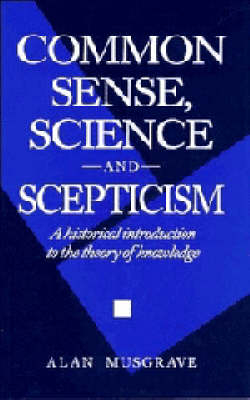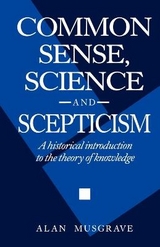
Common Sense, Science and Scepticism
A Historical Introduction to the Theory of Knowledge
Seiten
1993
Cambridge University Press (Verlag)
978-0-521-43040-1 (ISBN)
Cambridge University Press (Verlag)
978-0-521-43040-1 (ISBN)
- Titel erscheint in neuer Auflage
- Artikel merken
Zu diesem Artikel existiert eine Nachauflage
An introductory and historically-based survey of the debate between epistemological scepticism and the opposing dogmatism, out of which a third view, fallibilism, or critical rationalism, is developed.
Can we know anything for certain? Dogmatists think we can, sceptics think we cannot, and epistemology is the great debate between them. Some dogmatists seek certainty in the deliverances of the senses. Sceptics object that the senses are not an adequate basis for certain knowledge. Other dogmatists seek certainty in the deliverances of pure reason. Sceptics object that rational self-evidence is no guarantee of truth. This book is an introductory and historically-based survey of the debate, siding for the most part with scepticism to show that the desire to vanquish it has often led to doctrines of idealism or anti-realism. Scepticism, science and common sense produce another view, fallibilism or critical rationalism: although we can have little or no certain knowledge, as the sceptics maintain, we can and do have plenty of conjectural knowledge. Fallibilism incorporates an uncompromising realism about perception, science, and the nature of truth.
Can we know anything for certain? Dogmatists think we can, sceptics think we cannot, and epistemology is the great debate between them. Some dogmatists seek certainty in the deliverances of the senses. Sceptics object that the senses are not an adequate basis for certain knowledge. Other dogmatists seek certainty in the deliverances of pure reason. Sceptics object that rational self-evidence is no guarantee of truth. This book is an introductory and historically-based survey of the debate, siding for the most part with scepticism to show that the desire to vanquish it has often led to doctrines of idealism or anti-realism. Scepticism, science and common sense produce another view, fallibilism or critical rationalism: although we can have little or no certain knowledge, as the sceptics maintain, we can and do have plenty of conjectural knowledge. Fallibilism incorporates an uncompromising realism about perception, science, and the nature of truth.
1. The problem of knowledge; 2. Scepticism under attack; 3. Scepticism regarding the senses; 4. Empiricist psychology; 5. Idea-ism, appearance and reality; 6. Primary and secondary qualities; 7. Berkeley: idea-ism becomes idealism; 8. Hume: idea-ism becomes irrationalism; 9. Countering Hume on induction; 10. The Rationalist alternative; 11. Rationalism defended: Descartes; 12. Kant and the synthetic a priori; 13. Alternative geometries; 14. Truth and truth-theories; 15. Fallibilist realism.
| Erscheint lt. Verlag | 11.2.1993 |
|---|---|
| Zusatzinfo | 14 Line drawings, unspecified |
| Verlagsort | Cambridge |
| Sprache | englisch |
| Maße | 142 x 223 mm |
| Gewicht | 554 g |
| Themenwelt | Geisteswissenschaften ► Philosophie ► Erkenntnistheorie / Wissenschaftstheorie |
| ISBN-10 | 0-521-43040-2 / 0521430402 |
| ISBN-13 | 978-0-521-43040-1 / 9780521430401 |
| Zustand | Neuware |
| Informationen gemäß Produktsicherheitsverordnung (GPSR) | |
| Haben Sie eine Frage zum Produkt? |
Mehr entdecken
aus dem Bereich
aus dem Bereich
die Grundlegung der modernen Philosophie
Buch | Softcover (2023)
C.H.Beck (Verlag)
18,00 €
Buch | Softcover (2023)
Reclam, Philipp (Verlag)
7,00 €
die Evolution des Geistes
Buch | Softcover (2025)
Suhrkamp (Verlag)
30,00 €


![Was heißt Denken?. Vorlesung Wintersemester 1951/52. [Was bedeutet das alles?] - Martin Heidegger](/media/113619842)
